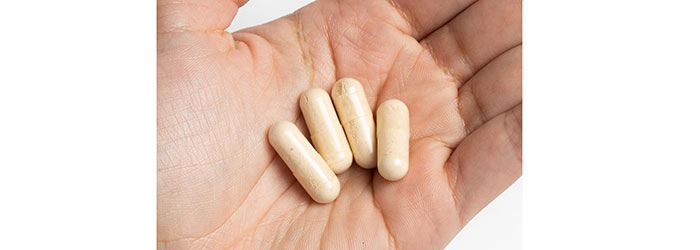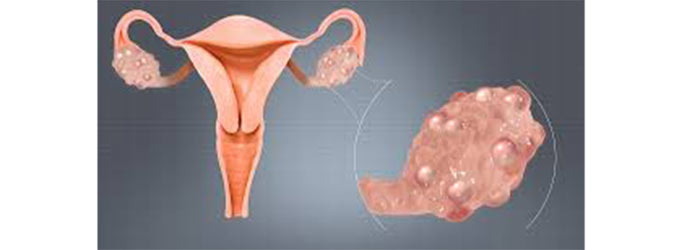What Is PCOS And Can Herbs Help?

Vitamins Essential During Pregnancy
August 9, 2022
Morning Sickness
October 4, 2022PCOS is the most common endocrine disorder affecting 10% of women in reproductive years. It is characterized by oligo-ovulation , hyperandrogenism, insulin resistance, increased LH to FSH ratio, decreased SHBG and hyperlipidemia. Patient may exhibit dysfunctional uterine bleeding, hirsutism(70% of PCOS women), menstrual irregularities, obesity, anovulatory infertility, miscarriage, acne, alopecia/male pattern hair loss, and affected mood (irritability, tension, depression).
Pathophysiology:
The primary cause is unclear, several theories are suggested.
- Genetic predisposition ( autosomal dominance): due to familial clustering and increased incidence of hyperinsulinemia and male patterned baldness in both male and female family members of women with anovulation, hyperandrogenism, and polycystic ovaries.
- Gestational factors: women with PCOS had above average birth rate and were born to obese mothers
Mechanism of PCOS:
Under normal menstrual cycles, GnRH is secreted from hypothalamus in pulsatile manner, GnRH stimulates the release of FSH and LH from pituitary gland, these hormones stimulates ovaries in follicular development and ovulation.
LH: stimulates theca cells in ovaries to produce androgen and progesterone, also triggers ovulation via estrogen peak level.
FSH: Stimulates the aromatase activity in the granulose cells to convert androgen to estrogen.
Local ovarian estrogen helps developing follicles, whereas androgen inhibit follicular growth.
In PCOS the GnRH plurality is higher, and there is an increase LH to FSH ratio, this causes an excessive production of androstenedione and testosterone. Since the estrogen levels are not high enough to suppress FSH and trigger LH (ovulation), follicles continue to grow (slowly) but not to the point of maturity, causing atresia of the developing follicles.
Patient with PCOS have high ovarian testosterone level (which suppresses FSH), high LH, low FSH and low ovarian estrogen (estradiol) level, and low progesterone (since there is no ovulation for corpus luteum to secrete progestogen).
In women with PCOS, ovaries produce higher level of testosterone, the adrenal glands also produce higher than normal level of androgen. It is suggested that women with PCOS have hyperactive production of Cytochrome P450 17 ( an enzyme responsible for forming androgen from DHEA), obesity worsen this conversion of DHEA to androgen, 50 % of women with PCOS have an elevated DHEA. The elevated DHEA is due to overproduction of ACTH from pituitary gland in response to stress. This elevated DHEA is converted to androgen via adrenal mechanism. Women with PCOS have both high levels of testosterone from both ovarian and adrenal system.
PCOS women who develop hirsutism have an increased sensitivity to androgen activity in the skin, causing abnormal hair growth.
Aromatase and 17 beta hydroxysteroid activities are increased in the fat cells which causes increased body weight.
The metabolism of estrogen by the way of 2-hydroxylation and 17 alpha oxidation is decreased; estrogen levels are increased due to peripheral aromatization of androstenedione causing hyperproduction of estrogen ( in estrone form) .
Patient with PCOS also have high prolactin levels due to abnormal estrogen feedback from the pituitary gland, elevated prolactin can also cause elevated estrogen.
So women with PCOS have low ovarian estradiol and high peripheral/circulating estrogen (mainly estrone)
Insulin resistance ( syndrome X): reduced glucose response to given amount of estrogen. In POCS patient who are hyper-androgenic anovulatory, hyperinsulinemia is accompanied by upper body obesity and an increase in abdominal fat. A waist to hip ratio greater than 0.85 inches indicate android fat distribution. Other causing factor of insulin resistance are poor diet ( high carbohydrate consumption) and stress.
Stress causes hormonal dysregulation, it also affects cortisol and blood sugar regulation. In response to stress, adrenals release cortisol, this induces an elevation of prolactin and increase androgen synthesis.
Sign and symptoms of PCOS:
Menstrual:
- Irregularities secondary to anovulation or oligo-ovulation
- DUB
- Irregular bleeding
- Unpredictable menstrual cycles
- Infertility
- Amenorrhea for longer than 4 month (r/o pregnancy, menopause)
- History of ovarian cysts
Hyperandrogenism:
- Acne
- Acanthosis nigricans
- Alopecia
- Hirsutism
- Virilization
Obesity
- Central body fat/android fat distribution
- Higher waist to hip ratio ( >0.85 inch)
- BMI >30
Lipoprotein profile
- Elevated total cholesterol
- Elevated triglyceride
- Elevated LDL
- Low level of HDL
- Low apoprotein A-1
Botanical/Herbs:
- Adaptogens are important for glycemic regulation
- Vitex: high prolactin and low progesterone
- Adaptogen used: dang she, ren shen, gan cao, ashwagandha, eleuthero, rhaponticum, rhodiola, wu wei zi
- HPA axis is supported by adaptogen, a combination of dang shen ( ren shen), eleuthero, and ashwagandha improve resistance to stress via adrenal modulation.
- Ginseng regulates blood sugar level
Blue Vervain
- Nervine
- Used for irritability associated with hormonal fluctuations
- Stimulate liver function and hormonal metabolism and elimination
Vitex
- Vitex regulate prolactin level though dopamine agonist activity
- Low progesterone due corpus luteum insufficiency
Gymnema
- Indian herb
- It is Antidiabetic, hypoglycemic , lipid lowering agent used for weight loss
- It has insulin modulating activity
- Reduced elevated triglyceride
- It suppress the perception of sweet taste in taste buds ( to be taken before food)
- Reduces desire for sweets
- Mechanism of action is by inhibition of glucose absorption in intestine
Bai shao
- Used for hyperprolactinemia
- Endometriosis
- Ovarian failure
- Androgen excess
- Modulates estrogen and prolactin
- It increase aromatase activity ( reducing androgen and increasing estrogen) helping growth of ovarian follicles
Sarei-to
- Reduces LH:FSH ratio
- Improves ovulation
Tribulus (bai ji li)
- Androgen and estrogen modulator
- General tonic
- Restore vitality and libido
- Aphrodisiac
Black Cohosh
- Improve FSH: LH ratio
- Improves endometrial thickness
Cinnamon
- Improves insulin sensitivity
Supplements:
- Chromium: regulates insulin and blood glucose level
- NAC: 600 mg/day. It can decrease LH, total testosterone, and free testosterone and increase SHGB
- 4 gr of Myo-inositol + 400 mcg of folic acid improve ovulation
- 1200 mg of D-chiro inositol shown to improve insulin sensitivity and reduce testosterone level
- Pinitol at 600 mg twice a day for 3 months reduces blood glucose level
Chinese Herbal Formula for PCOS
The effectiveness of a Chinese formula called Tian Gui Fang was tested in comparison to the drug, metformin on patients with PCOS. The patients were divided into two groups, each of which was treated with either metformin or Tian Gui Fang for a period of 3 months. After the treatment, 4 out of the 8 patients on metformin had restoration of their menstrual cycle, and two of them had bi-phasic BBT. Their testosterone levels had also decreased.
In the group that received the Chinese medicine, 6 patients out of the 8 had a restored menstrual cycle, as well as a bi-phasic BBT, and both testosterone levels and body mass index had decreased significantly.
The conclusion of the study was that both therapies can induce ovulation, but that Chinese herbal medicine is more effective in restoring ovulation and normal BBT measures than metformin.
‘Study on treatment of hyperandrogenism and hyperinsulinism in PCOS with Chinese herbal formula, Tian Gui Fang’, Hou J, Yu J, Wei M 2000.
Chinese herbal medicine can significantly reduce plasma LH in PCOS patients
The effectiveness of Chinese herbal medicine was tested on patients with high LH levels due to PCOS. The conclusion was that 8 weeks of treatment with Chinese herbal medicine significantly reduced plasma LH level.
‘Effects of Unkei-to, a herbal medicine, on endocrine function and ovulation in women with high basal levels of LH secretion’ J Reprod. Med 2001 May, Sakai M
Chinese herbal medicine can treat anovulation in PCOS patients
In Japan, a Chinese herbal formula was tested on patients with PCOS to find an effective treatment without side effects that could be used instead of clomid or gonadotropin therapy. After a course of treatment, the FSH/LH ratio significantly decreased, and the ovulatory rate was 70.6%. Serum testosterone did no change during treatment. The study concludes that the Chinese formula may be useful for the treatment of anovulation in PCOS patients.
‘Induction of ovulation by Sarei-to for polycystic ovary syndrome patients’ Sakai A, Endocr J, Feb 1999
Kidney Yin-nourishing herbs can promote ovarian follicular growth, resulting in ovulation and pregnancy
Shanghai Medical University carried out trials to evaluate the effectiveness of Yin supplementing Chinese medical herbs on 35 patients with polycystic anovulation. The patients were treated for 3 months, and a variety of tests were carried out before and after the course of treatment. Testosterone levels lowered significantly in 59.7% of patients, and a regular cycle was re-established. 41.2% of women became pregnant. The study concluded that Kidney Yin nourishing herbs could provide a good microcirculation for ovarian follicular growth, which results in ovulation and pregnancy.
“Clinical observation on treatment of hyperinsulinemia and hyperandrogenism in anovulatory patients with Kidney yin replenishing herbs’ Sept 1996, Zhou LR, Yu J
At Acuwellness Center, our Acupuncturist specializes in fertility, genecology and women’s health, our office provides Acupuncture, TCM ( traditional Chinese Medicine), Chinese medicinal herbs, Western medicinal herbs and supplements to your specific fertility/gynecological need.





